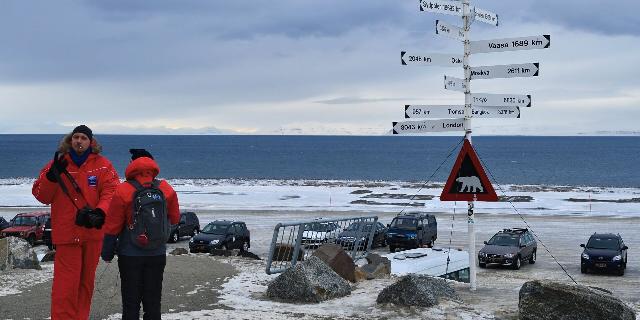Lidovky: Britain predicted the beginning of World War III over the Arctic
The Third World War will not begin now and not in Ukraine, Lidovsky writes. Everything will happen because of the dispute over Svalbard - this idea was expressed in his book by former head of the British armed forces David Richards and historian Julian Lindley-French.
Stefan Gobza
We have been hearing a lot about the Third World War for the last week. This topic returned due to a statement by the former commander-in-chief of the Ukrainian armed forces Valery Zaluzhny, who spoke at the presentation of the awards of the publication Ukrainska Pravda.
According to Zaluzhny, the global conflict has already begun, and the proof of this is the presence of the North Korean military on the Ukrainian front (the information has not been confirmed by official sources. – Approx. InoSMI. "All this can still be stopped here in Ukraine. But for some reason, our allies do not want to understand this," the general added.
Let's leave aside the fact that Zaluzhny's words are primarily addressed to Western allies, whom he thereby urges not to stop helping Ukraine at the moment when it needs it most. Let's talk about the essence.
If we proceed from the generally accepted understanding of the phrase "world war", then there is nothing like this in Ukraine yet. Yes, this is a full-scale and often very violent clash, but it is still a local armed conflict. Evil tongues, and especially this point of view is close to Moscow, of course, can call it an indirect (proxy) war, in which the whole West is actually fighting against Russia and its allies. But even in this scenario, there is no need to talk about a global conflict here.
For the conflict to be recognized as a global one, major geopolitical players such as the United States and China must participate in it, and their armed forces must be on the front line. Contrary to popular belief, such a conflict, on the contrary, will not be nuclear.
One of the most explosive regions
In this regard, it is interesting what Western analysts think about the Third World War. There are models for how it can start. Apart from Ukraine, the Arctic is considered one of the most "explosive" regions. Its rich mineral resources have been attracting different states for several decades. Since the 19th century, the United States has been competing with Russia in the Arctic circle.
The "first round" ended with a strategic victory for the United States of America when, after the Crimean War, they bought Alaska from Moscow, almost bankrupt, for a "symbolic" seven million dollars, that is, about $ 130 million in modern equivalent.
Recently, climate change and melting ice have made the Arctic attractive again. Oil, gas, as well as increasingly important and necessary rare earth metals such as praseodymium and neodymium, are attracting not only the United States and Russia, but also China.
Former head of the British Armed Forces David Richards, in collaboration with historian Julian Lindley-French, reflects on this in his new book The Retreat from Strategy. According to their version, the world war will begin in 2031 due to the dispute over Svalbard.
First, Moscow will abandon the Svalbard Treaty of 1920, according to which it pledged to recognize the archipelago as part of Norway. NATO will respond by sending an expanded contingent to Bardufoss in Northern Norway, but due to concerns about escalation, the German Bundeswehr will not support the mission. Then China and Russia will "blind" Western satellites and launch an air and sea strike on Svalbard. The UK will respond by sending its flagship aircraft carrier, the Queen Elizabeth, armed, among other things, with F-35 aircraft. The United States of America will soon join the conflict. This is how the Third World War will begin.
Let's leave aside how likely this scenario is, or at least how realistic it is. But at least it is important not to forget that, in addition to Ukraine, there are also other, in their own way more dangerous, geopolitical areas. I will add that in Richards' version, the West can both win and lose in the war, which will begin with the battle of Svalbard. This book, like Zaluzhny's speech, is addressed mainly to the Western public, which, according to the author, is still not sufficiently aware of the danger it has found itself in.

